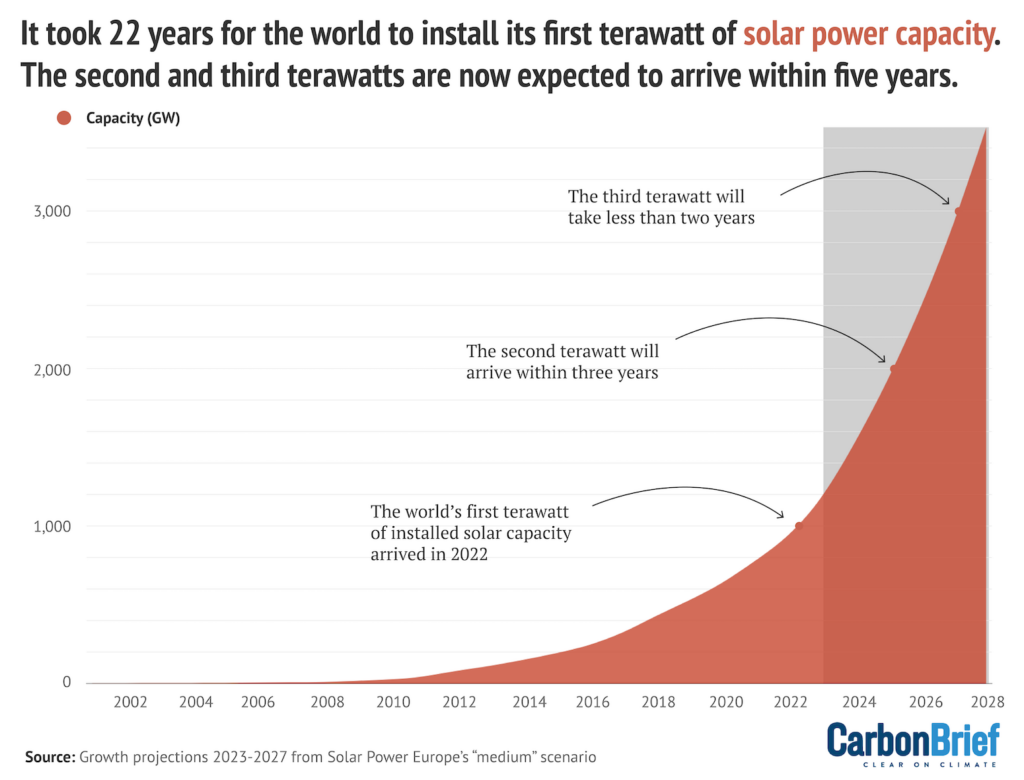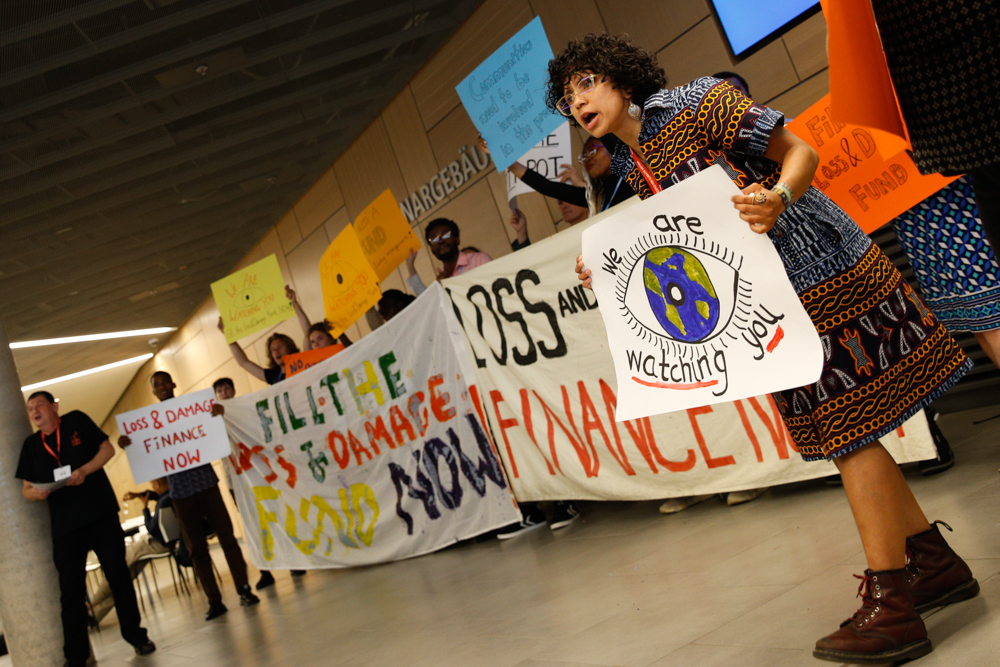Welcome to Carbon Brief’s DeBriefed.
An essential guide to the week’s key developments relating to climate change.
This is an online version of Carbon Brief’s weekly DeBriefed email newsletter. Subscribe for free here.
This week
Bonn talks end
AGENDA WOES: UN climate negotiations in the German city of Bonn were “at risk of collapse” early in the week as nations could not agree on an agenda, Climate Home News reported. Pakistani co-chair of the talks Nabeel Munir told negotiators they were like “a class of primary school [children]” following a passionate exchange of views, as captured in this Twitter thread written from the conference’s plenary hall.
MITIGATION AND FINANCE: The dispute was over the inclusion of a “mitigation work programme” to scale up emissions cuts, which some developing countries said must be accompanied by climate-finance discussions, according to the Hindustan Times. Climate Action Network’s ECO newsletter noted that “climate finance is what makes climate action possible”. An agenda was finally agreed with just one day to go, but without mitigation or finance on it. As the conference drew to a close yesterday, Bloomberg reported that diplomats “pushing for stronger climate action” walked away “disappointed by inter-country bickering”.
IN DEPTH: Negotiations continued on topics such as the “global stocktake” of progress towards Paris Agreement goals and a “just transition work programme”. All the key issues are covered in Carbon Brief’s in-depth write-up of the talks. Reuters reported that climate activist Greta Thunberg joined a panel launching a Climate Analytics report, which concluded renewables should be built five times faster to limit warming to 1.5C. As thoughts now turn to the next major climate conference, COP28 in December, a Financial Times editorial stated that “time is running out” for host nation the United Arab Emirates to come up with a clear plan.
Oh Shell no
LONG TERM: Bloomberg reported that a revision of Shell’s strategy by its CEO Wael Sawan sees “a long-term role for natural gas”. Oil output will remain “steady or slightly higher” into 2030, according to the strategy. Just two months ago, Carbon Brief showed that Shell’s own energy scenarios involved an immediate end to oil-and-gas expansion, if global warming is to be limited to 1.5C.
MORE DEMAND: The International Energy Agency said global demand for oil will keep rising until at least 2028, with a peak “in sight” this decade, according to the Times. In its coverage, Axios warned that previous predictions about “peak oil” have “never [come] to fruition”. It added that “what happens after a peak – a plateau, a gradual decline, or a steep one” – would be critical. Meanwhile, Agence-France Presse reported that UN secretary-general António Guterres has taken aim at the fossil-fuel industry, stating: “The problem is not simply fossil fuel emissions. It’s fossil fuels – period.”
Around the world
- ATLANTIC TO ANTARCTIC: Scientists have raised concerns about ongoing record high global sea surface temperatures and record low Antarctic sea ice.
- POLES APART: The Polish government will appeal against EU rules banning the sale of petrol and diesel cars from 2035, according to Politico. In Germany, the ruling coalition agreed on banning new fossil-fuelled boilers, Bloomberg reported.
- OIL OFFSETS: Saudi Arabian companies, including the world’s largest oil firm Saudi Aramco, have bought more than 2.2m tonnes of carbon credits at an event in the Kenyan capital, Nairobi – billed as the largest ever sale of its kind, Reuters reported.
- PLEDGING TO PLUG: Turkmenistan, which was responsible for the highest number of methane “super-emitter” events in the world last year, has approved a “roadmap” to plug some of these massive leaks, according to the Guardian.
- KIDS AREN’T ALRIGHT: A group of 16 residents, aged between five and 22, are taking the US state of Montana to court in what the New York Times described as a “landmark” climate trial.
50.9%
The percentage of installed electricity capacity in China that is now renewables and nuclear, meeting a 2025 target two years early, according to Xinhua.
Latest climate research
- Developing, climate-vulnerable countries are often overlooked for international financial support based on flawed assessments of their economic health, suggested a new study in Climate Policy.
- Sea level rise along the US east coast and Gulf of Mexico rapidly accelerated between 2010-22, coinciding with a record-breaking North Atlantic hurricane season, according to new research published in the Journal of Climate.
- Different ways of accounting for the climate effects of aviation result in very different requirements for carbon dioxide (CO2) removal from the atmosphere and different temperature outcomes over time, according to a new study in Wires Climate Change.
Captured
Solar power set to soar

New projections published by trade body SolarPower Europe suggest that, having taken 22 years to reach its first terawatt (TW) of solar power, the world will reach its second in just three years and its third just two years after that. Carbon Brief’s Simon Evans has posted a Twitter thread about the new analysis.
Spotlight
Could a shipping tax offer climate finance hope?

Reporting from Bonn, Carbon Brief analyses whether a tax on shipping could help to raise funds to help countries affected by climate change.
In the corridors of the World Conference Centre in Bonn, all anyone can talk about is money. Talks were held up because a group of mainly large, middle-income countries – represented most vocally by Bolivian negotiator Diego Pacheco – argued that there would be “no use” discussing emissions cuts without considering how countries would pay for them.
The loss-and-damage fund was the headline-grabbing achievement at the COP27 summit in November, but there is nothing new about climate finance taking centre stage at UN climate talks.
Campaigners say developing countries will need at least $400bn annually to deal with loss and damage resulting from climate change by 2030. The funds required to help developing countries decarbonise and prepare for climate-related shocks will undoubtedly run into the trillions.
So where will all this money come from? The traditional answer is that developed countries – the US, Europe and a handful of others – should provide it, as they are obliged to under the Paris Agreement. But as they have not met the relatively modest $100bn-by-2020 annual target they pledged in 2009, it seems pragmatic to seek out alternatives.
“You do what needs to be done to get there and that includes…looking for all the levers that you can outside of the process,” explained Marshall Islands negotiator Tina Stege in a press briefing.
Such alternatives could come in the form of taxes or levies on high-emitting activities, such as flying and fossil-fuel extraction. Not only could such taxes generate large sums of money, much of it would come directly from big polluters, incentivising them to emit less.
Some of these ideas are gaining traction among those in power and a carbon tax on shipping has emerged as the most feasible first step. This is the one that French president Emmanuel Macron is expected to push at a much-hyped Summit for a New Global Financing Pact in Paris next weekend. His team has failed to garner much enthusiasm for taxes on financial sector transactions or fossil-fuel company profits, experts tell Carbon Brief.
A shipping levy could initially raise around $100bn each year and has growing support from countries at the UN’s International Maritime Organization (IMO), which is due to meet in July.
However, even if such a levy were agreed, there is no guarantee it would all be channelled to assist developing countries. The shipping industry has argued that the funds should instead help it decarbonise.
Macron’s summit is already floundering, with hardly any developed-country leaders slated to attend. Progress on the shipping levy could emerge as the one of the few notable outcomes from a conference with the lofty aim of “comprehensive” global financial system reform.
With climate-related costs mounting, developing countries are likely going to continue pulling all the levers.
Watch, read, listen
‘BURNED TO THE GROUND’: The Guardian made a film about the Canadian village of Lytton, which reached a national record temperature of 49.6C in June 2021 then burned down two days later in a wildfire.
MAKE IT PERSONAL: The Climate Question podcast on the BBC World Service has convened a panel of global experts to answer listeners’ questions from around the world on what they can do about climate change.
LIFE IN THE OIL SANDS: Comic artist Kate Beaton has written a graphic novel, titled “Ducks”, about two years she spent working in Canada’s oil sands. It is reviewed in the London Review of Books.
Coming up
Pick of the jobs
- Politico is hiring a California climate reporter to anchor a new newsletter | Salary: $80,000-$120,000. Location: Sacramento, California.
- Associated Press is hiring a Spanish-language climate reporter to cover water, climate change and biodiversity in US Latino communities | Salary: $72,365-$80,714. Location: US.
- The University of Reading’s Department of Meteorology is seeking a lecturer in atmospheric radiation, composition and climate | Salary: £45,585-£56,021. Location: Reading, UK.
DeBriefed is edited by Daisy Dunne. Please send any tips or feedback to [email protected].
Sharelines from this story
- SEO Powered Content & PR Distribution. Get Amplified Today.
- EVM Finance. Unified Interface for Decentralized Finance. Access Here.
- Quantum Media Group. IR/PR Amplified. Access Here.
- PlatoAiStream. Web3 Data Intelligence. Knowledge Amplified. Access Here.
- Source: https://www.carbonbrief.org/debriefed-16-june-2023-bonn-talks-close-shell-sticks-to-fossil-fuels-record-ocean-heat/



